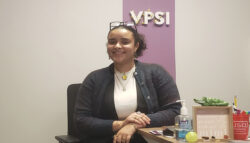Ottawa’s largest school board has proposed a controversial change to the high school graduation ceremony that would allow those not receiving a standard diploma to be recognized for their achievements.
Emma Hong, a student trustee with the Ottawa-Carleton District School Board, said she’s been excited in anticipation of her “moment of glory” when she gets to walk across the stage at the spring ceremony.
One of the areas of improvement for us is to include all levels of student achievement in the celebration of accomplishments during their secondary school journey.
Statement from the OCDSB
But the OCDSB’s proposed change would shift the event from a graduation to a commencement ceremony and that has ignited a controversy over the benefits and drawbacks of inclusiveness.
“I’m very excited about having that moment of glory, walking across the stage,” said Hong. “But I don’t see why my peers, who may not necessarily be following that same path as I am, can’t walk across the stage.”
The board is proposing the change to make the ceremony more inclusive.
“One of the areas of improvement for us is to include all levels of student achievement in the celebration of accomplishments during their secondary school journey,” the OCDSB said in a statement to Capital Current. Those types of achievement include “the Ontario Secondary School Diploma (OSSD), the Ontario Secondary School Certificate (OSSC) and the Certificate of Achievement (COA).”
Hong said the change would allow for a broader definition of educational progress — a definition that more closely aligns with student views. Furthermore, she said, there can be different achievement metrics and this new system would celebrate them.
“Commencement is equity-based and not marks-based. At commencement, students of all levels of achievement will be able to cross the stage with their peers,” the board says.
The OCDSB has 25 high schools, with more than 23,000 students, according to a 2022 report.
Tasha Ausman, a University of Ottawa professor and Quebec high school teacher, says she believes one question that arises from the OCDSB proposal is how schools would balance students who deserve to graduate but can’t for a variety of reasons, and students who skipped classes and didn’t try.
She said the board needs to consult with parents to work out the details.
“The part that’s in a grey area,” said Ausman, “are students who have immigrated newly to Canada and are picking up all the requisite credits to go the university or college program of their choice, and who don’t have an OSSD but are actually leaving and enrolled somewhere next year.”
Ausman said it could become a “hot potato” when teachers or the board decide who may deserve to walk across the stage and who may not.
She said she believes one benefit of such a change would be to ease the “timing anxiety” of not knowing if you pass a class until after the ceremony. A student could have an exam days before the ceremony and be on the brink of passing and not know if they will graduate. This way, they can still participate and have that moment with their peers.
The ceremony could look largely the same, Ausman said, but the change from graduation to commencement may have convinced parents and the public that the school board was making a bigger change to the system.
“To call it a graduation or commencement, I think we’re in a semantics loop,” Ausman said. “I might call it a leaving ceremony.”
I’m very excited about having that moment of glory, walking across the stage, but I don’t see why my peers, who may not necessarily be following that same path as I am, can’t walk across the stage.
Emma Hong, student trustee with the OCDSB
Critics have said the high schools would essentially be giving out participation trophies — watering down the meaning of a graduation diploma if others are recognized at a year-end ceremony.
Canadian education commentator Paul Bennett says the change comes at a time of “extreme grade inflation and everyone-gets-a-pass education.”
But Hong doesn’t see it that way, and she believes that it could be harmful to suggest that idea.
In talks with her friends, Hong said she decided that “these ceremonies, although they’re an incredible kind of once-in-a-lifetime moment, ultimately you’re just walking up and having that moment of recognition. That’s not the most critical component of graduation.”
The most critical part for her would be getting a diploma for years of hard work, which she said she hopes to obtain in a few months.
The board is calling for feedback on the proposal. Parents and other local residents have until March 29 to voice their thoughts, and the results of the public outreach campaign will be tabled at a board meeting in April.




